#us copyrights
Text
Alright US mutuals, if you are interested in, morbidly fascinated by, or anxiously doomscrolling through AI news, including Stable Diffusion, Llama, ChatGPT or Dalle, you need to be aware of this.
The US Copyright Office has submitted a request for comment from the general public. Guidelines can be found on their site, but the gist of it is that they are taking citizen statements on what your views on AI are, and how the Copyright Office should address the admittedly thorny issues in rulings.
Be polite, be succinct, and be honest. They have a list of questions or suggestions, but in truth are looking to get as much data from the general public as possible. If you have links to papers or studies examining the economic impacts of AI, they want them. If you have anecdotal stories of losing commissions, they want them. If you have legal opinions, experience using these tools, or even a layman's perspective of how much human input is required for a piece of work to gain copyright, they want it.
The deadline is Oct 18th and can be submitted via the link in the article. While the regulatory apparatus of the US is largely under sway by corporate interests, this is still the actual, official time for you to directly tell the government what you think and what they should do. Comments can be submitted by individuals or on behalf of organizations. So if you are a small business, say a print shop, you can comment on behalf of the print shop as well.
20K notes
·
View notes
Video
youtube
You leaving all yo money 💰 on the table! LISTEN 👀 who gets your publishi...
#youtube#ascap#mlc#bmi#soundexchange#music#music review#music consultation#songtrust#us copyrights#performing rights organizations#us isrc code#online marketing#online promotions#online music promotions#radio#radio promotions#artist development#facebook#tiktok#instagram#twitter#x#blog placement
0 notes
Text

"The lawsuit, filed in federal court in Manhattan, said the band was also objecting to Trump’s use of the song because members Jack White and Meg White “vehemently oppose the policies adopted and actions taken by Defendant Trump when he was President and those he has proposed for the second term he seeks.”
Several prominent musicians have previously criticized Trump for using their songs at rallies. Last week, a federal judge in Atlanta ruled that Trump and his campaign must stop using the song “Hold On, I’m Coming” after a lawsuit from the estate of Isaac Hayes Jr."
source 1
source 2
source 3
#destiel meme news#destiel meme#news#united states#us news#donald trump#fuck trump#the white stripes#seven nation army#copyright law#copyright infringement#copyright#2024 elections#2024 presidential election#2024 presidential race#presidential election#vote blue#vote harris#vote kamala#vote kamala harris#meg white#jack white#fuck him up!!!!#white stripes
2K notes
·
View notes
Text
It all started with a mouse
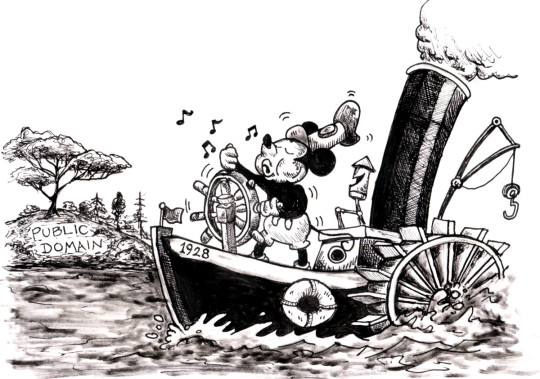
For the public domain, time stopped in 1998, when the Sonny Bono Copyright Act froze copyright expirations for 20 years. In 2019, time started again, with a massive crop of works from 1923 returning to the public domain, free for all to use and adapt:
https://web.law.duke.edu/cspd/publicdomainday/2019/
No one is better at conveying the power of the public domain than Jennifer Jenkins and James Boyle, who run the Duke Center for the Study of the Public Domain. For years leading up to 2019, the pair published an annual roundup of what we would have gotten from the public domain in a universe where the 1998 Act never passed. Since 2019, they've switched to celebrating what we're actually getting each year. Last year's was a banger:
https://pluralistic.net/2022/12/20/free-for-2023/#oy-canada
But while there's been moderate excitement at the publicdomainification of "Yes, We Have No Bananas," AA Milne's "Now We Are Six," and Sherlock Holmes, the main event that everyone's anticipated arrives on January 1, 2024, when Mickey Mouse enters the public domain.
The first appearance of Mickey Mouse was in 1928's Steamboat Willie. Disney was critical to the lobbying efforts that extended copyright in 1976 and again in 1998, so much so that the 1998 Act is sometimes called the Mickey Mouse Protection Act. Disney and its allies were so effective at securing these regulatory gifts that many people doubted that this day would ever come. Surely Disney would secure another retrospective copyright term extension before Jan 1, 2024. I had long arguments with comrades about this – people like Project Gutenberg founder Michael S Hart (RIP) were fatalistically certain the public domain would never come back.
But they were wrong. The public outrage over copyright term extensions came too late to stave off the slow-motion arson of the 1976 and 1998 Acts, but it was sufficient to keep a third extension away from the USA. Canada wasn't so lucky: Justin Trudeau let Trump bully him into taking 20 years' worth of works out of Canada's public domain in the revised NAFTA agreement, making swathes of works by living Canadian authors illegal at the stroke of a pen, in a gift to the distant descendants of long-dead foreign authors.
Now, with Mickey's liberation bare days away, there's a mounting sense of excitement and unease. Will Mickey actually be free? The answer is a resounding YES! (albeit with a few caveats). In a prelude to this year's public domain roundup, Jennifer Jenkins has published a full and delightful guide to The Mouse and IP from Jan 1 on:
https://web.law.duke.edu/cspd/mickey/
Disney loves the public domain. Its best-loved works, from The Sorcerer's Apprentice to Sleeping Beauty, Pinnocchio to The Little Mermaid, are gorgeous, thoughtful, and lively reworkings of material from the public domain. Disney loves the public domain – we just wish it would share.
Disney loves copyright's other flexibilities, too, like fair use. Walt told the papers that he took his inspiration for Steamboat Willie from Charlie Chaplin and Douglas Fairbanks, making fair use of their performances to imbue Mickey with his mischief and derring do. Disney loves fair use – we just wish it would share.
Disney loves copyright's limitations. Steamboat Willie was inspired by Buster Keaton's silent film Steamboat Bill (titles aren't copyrightable). Disney loves copyright's limitations – we just wish it would share.
As Jenkins writes, Disney's relationship to copyright is wildly contradictory. It's the poster child for the public domain's power as a source of inspiration for worthy (and profitable) new works. It's also the chief villain in the impoverishment and near-extinction of the public domain. Truly, every pirate wants to be an admiral.
Disney's reliance on – and sabotage of – the public domain is ironic. Jenkins compares it to "an oil company relying on solar power to run its rigs." Come January 1, Disney will have to share.
Now, if you've heard anything about this, you've probably been told that Mickey isn't really entering the public domain. Between trademark claims and later copyrightable elements of Mickey's design, Mickey's status will be too complex to understand. That's totally wrong.

Jenkins illustrates the relationship between these three elements in (what else) a Mickey-shaped Venn diagram. Topline: you can use all the elements of Mickey that are present in Steamboat Willie, along with some elements that were added later, provided that you make it clear that your work isn't affiliated with Disney.
Let's unpack that. The copyrightable status of a character used to be vague and complex, but several high-profile cases have brought clarity to the question. The big one is Les Klinger's case against the Arthur Conan Doyle estate over Sherlock Holmes. That case established that when a character appears in both public domain and copyrighted works, the character is in the public domain, and you are "free to copy story elements from the public domain works":
https://freesherlock.files.wordpress.com/2013/12/klinger-order-on-motion-for-summary-judgment-c.pdf
This case was appealed all the way to the Supreme Court, who declined to hear it. It's settled law.
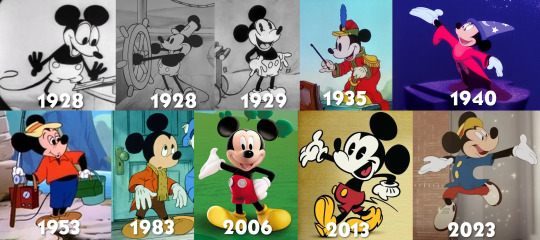
So, which parts of Mickey aren't going into the public domain? Elements that came later: white gloves, color. But that doesn't mean you can't add different gloves, or different colorways. The idea of a eyes with pupils is not copyrightable – only the specific eyes that Disney added.
Other later elements that don't qualify for copyright: a squeaky mouse voice, being adorable, doing jaunty dances, etc. These are all generic characteristics of cartoon mice, and they're free for you to use. Jenkins is more cautious on whether you can give your Mickey red shorts. She judges that "a single, bright, primary color for an article of clothing does not meet the copyrightability threshold" but without settled law, you might wanna change the colors.
But what about trademark? For years, Disney has included a clip from Steamboat Willie at the start of each of its films. Many observers characterized this as a bid to create a de facto perpetual copyright, by making Steamboat Willie inescapably associated with products from Disney, weaving an impassable web of trademark tripwires around it.
But trademark doesn't prevent you from using Steamboat Willie. It only prevents you from misleading consumers "into thinking your work is produced or sponsored by Disney." Trademarks don't expire so long as they're in use, but uses that don't create confusion are fair game under trademark.
Copyrights and trademarks can overlap. Mickey Mouse is a copyrighted character, but he's also an indicator that a product or service is associated with Disney. While Mickey's copyright expires in a couple weeks, his trademark doesn't. What happens to an out-of-copyright work that is still a trademark?
Luckily for us, this is also a thoroughly settled case. As in, this question was resolved in a unanimous 2000 Supreme Court ruling, Dastar v. Twentieth Century Fox. A live trademark does not extend an expired copyright. As the Supremes said:
[This would] create a species of mutant copyright law that limits the public’s federal right to copy and to use expired copyrights.
This elaborates on the Ninth Circuit's 1996 Maljack Prods v Goodtimes Home Video Corp:
[Trademark][ cannot be used to circumvent copyright law. If material covered by copyright law has passed into the public domain, it cannot then be protected by the Lanham Act without rendering the Copyright Act a nullity.
Despite what you might have heard, there is no ambiguity here. Copyrights can't be extended through trademark. Period. Unanimous Supreme Court Decision. Boom. End of story. Done.
But even so, there are trademark considerations in how you use Steamboat Willie after Jan 1, but these considerations are about protecting the public, not Disney shareholders. Your uses can't be misleading. People who buy or view your Steamboat Willie media or products have to be totally clear that your work comes from you, not Disney.

Avoiding confusion will be very hard for some uses, like plush toys, or short idents at the beginning of feature films. For most uses, though, a prominent disclaimer will suffice. The copyright page for my 2003 debut novel Down and Out in the Magic Kingdom contains this disclaimer:
This novel is a work of fiction, set in an imagined future. All the characters and events portrayed in this book, including the imagined future of the Magic Kingdom, are either fictitious or are used fictitiously. The Walt Disney Company has not authorized or endorsed this novel.
https://us.macmillan.com/books/9781250196385/downandoutinthemagickingdom
Here's the Ninth Circuit again:
When a public domain work is copied, along with its title, there is little likelihood of confusion when even the most minimal steps are taken to distinguish the publisher of the original from that of the copy. The public is receiving just what it believes it is receiving—the work with which the title has become associated. The public is not only unharmed, it is unconfused.
Trademark has many exceptions. The First Amendment protects your right to use trademarks in expressive ways, for example, to recreate famous paintings with Barbie dolls:
https://www.copyright.gov/fair-use/summaries/mattel-walkingmountain-9thcir2003.pdf
And then there's "nominative use": it's not a trademark violation to use a trademark to accurately describe a trademarked thing. "We fix iPhones" is not a trademark violation. Neither is 'Works with HP printers.' This goes double for "expressive" uses of trademarks in new works of art:
https://en.wikipedia.org/wiki/Rogers_v._Grimaldi
What about "dilution"? Trademark protects a small number of superbrands from uses that "impair the distinctiveness or harm the reputation of the famous mark, even when there is no consumer confusion." Jenkins says that the Mickey silhouette and the current Mickey character designs might be entitled to protection from dilution, but Steamboat Willie doesn't make the cut.
Jenkins closes with a celebration of the public domain's ability to inspire new works, like Disney's Three Musketeers, Disney's Christmas Carol, Disney's Beauty and the Beast, Disney's Around the World in 80 Days, Disney's Alice in Wonderland, Disney's Snow White, Disney's Hunchback of Notre Dame, Disney's Sleeping Beauty, Disney's Cinderella, Disney's Little Mermaid, Disney's Pinocchio, Disney's Huck Finn, Disney's Robin Hood, and Disney's Aladdin. These are some of the best-loved films of the past century, and made Disney a leading example of what talented, creative people can do with the public domain.
As of January 1, Disney will start to be an example of what talented, creative people give back to the public domain, joining Dickens, Dumas, Carroll, Verne, de Villeneuve, the Brothers Grimm, Twain, Hugo, Perrault and Collodi.
Public domain day is 17 days away. Creators of all kinds: start your engines!

If you'd like an essay-formatted version of this post to read or share, here's a link to it on pluralistic.net, my surveillance-free, ad-free, tracker-free blog:
https://pluralistic.net/2023/12/15/mouse-liberation-front/#free-mickey

Image:
Doo Lee (modified)
https://web.law.duke.edu/sites/default/files/images/centers/cspd/pdd2024/mickey/Steamboat-WIllie-Enters-Public-Domain.jpeg
CC BY 4.0
https://creativecommons.org/licenses/by/4.0/deed.en
#pluralistic#copyfight#scotus#mickey mouse#public domain#ip#contract#trademark#tm#jennifer jenkins#copyright#disney#nominative use
6K notes
·
View notes
Text
AI models can seemingly do it all: generate songs, photos, stories, and pictures of what your dog would look like as a medieval monarch.
But all of that data and imagery is pulled from real humans — writers, artists, illustrators, photographers, and more — who have had their work compressed and funneled into the training minds of AI without compensation.
Kelly McKernan is one of those artists. In 2023, they discovered that Midjourney, an AI image generation tool, had used their unique artistic style to create over twelve thousand images.
“It was starting to look pretty accurate, a little infringe-y,” they told The New Yorker last year. “I can see my hand in this stuff, see how my work was analyzed and mixed up with some others’ to produce these images.”
For years, leading AI companies like Midjourney and OpenAI, have enjoyed seemingly unfettered regulation, but a landmark court case could change that.
On May 9, a California federal judge allowed ten artists to move forward with their allegations against Stability AI, Runway, DeviantArt, and Midjourney. This includes proceeding with discovery, which means the AI companies will be asked to turn over internal documents for review and allow witness examination.
Lawyer-turned-content-creator Nate Hake took to X, formerly known as Twitter, to celebrate the milestone, saying that “discovery could help open the floodgates.”
“This is absolutely huge because so far the legal playbook by the GenAI companies has been to hide what their models were trained on,” Hake explained...
“I’m so grateful for these women and our lawyers,” McKernan posted on X, above a picture of them embracing Ortiz and Andersen. “We’re making history together as the largest copyright lawsuit in history moves forward.” ...
The case is one of many AI copyright theft cases brought forward in the last year, but no other case has gotten this far into litigation.
“I think having us artist plaintiffs visible in court was important,” McKernan wrote. “We’re the human creators fighting a Goliath of exploitative tech.”
“There are REAL people suffering the consequences of unethically built generative AI. We demand accountability, artist protections, and regulation.”
-via GoodGoodGood, May 10, 2024
#ai#anti ai#fuck ai art#ai art#big tech#tech news#lawsuit#united states#us politics#good news#hope#copyright#copyright law
2K notes
·
View notes
Text
SOOO...WHAT THE HELL IS THIS


First off, I apologize for tagging artists, but you should know about this shit.
I'll quickly bring you up to speed.
YouTube has slowed down in Russia and the authorities are "recommending" to move to domestic platforms like Rutube, which of course can't compete with YouTube in any way.
So, even earlier my friends and I faced that our work was reuploaded to Rutube without our knowledge.
And this afternoon kind people, threw a couple of screenshots with reuploads to RuTube also other artists. I will attach all these screenshots to this post. Among the artists I know are: @anniflamma @gigizetz @wolfythewitch @mircsy
Unfortunately, RuTube has a very shitty system of copyright reports, where they ask you to provide your personal data (passport, address and DOCUMENTS that prove your copyright), so last time with friends this situation was let go, because there were no serious hits there.
Unfortunately, the only possibility now is to try to throw technical reports, but this is also unlikely to work.
I will also attach links here for some animations
I'm very sorry for this..
#art#stealing#copyright#what the hell#this is not good#gods help us#wolfythewitch#gigi#mircsy#annifamma
1K notes
·
View notes
Text
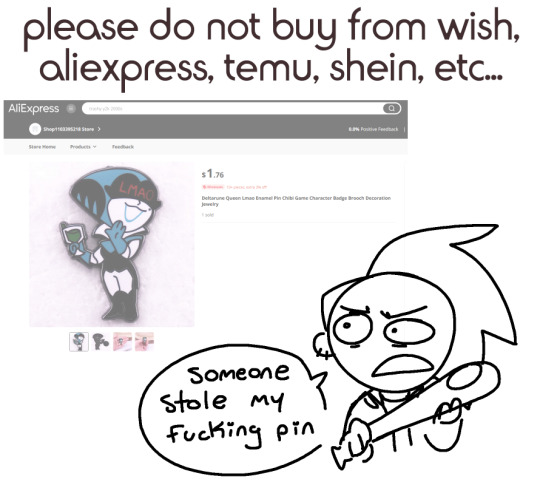
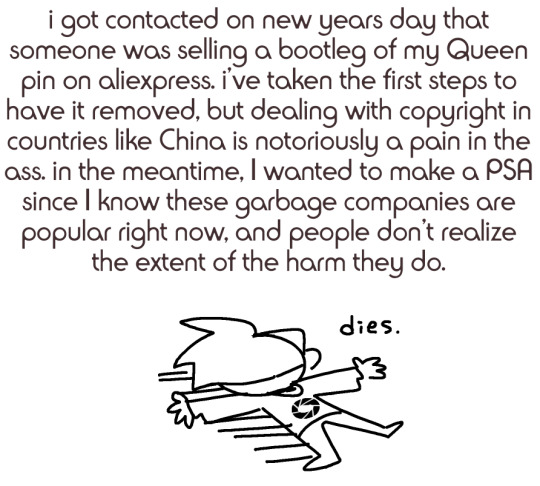
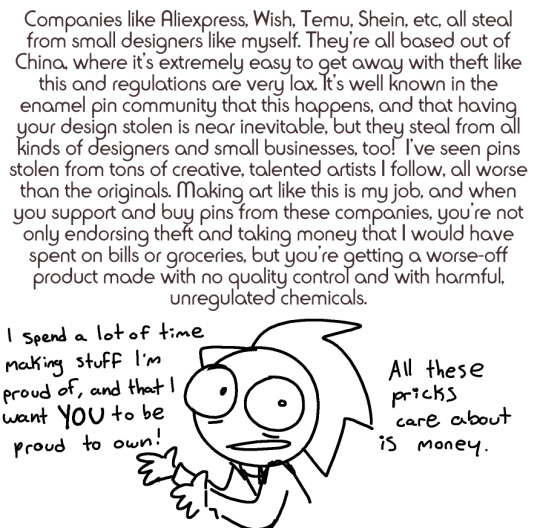
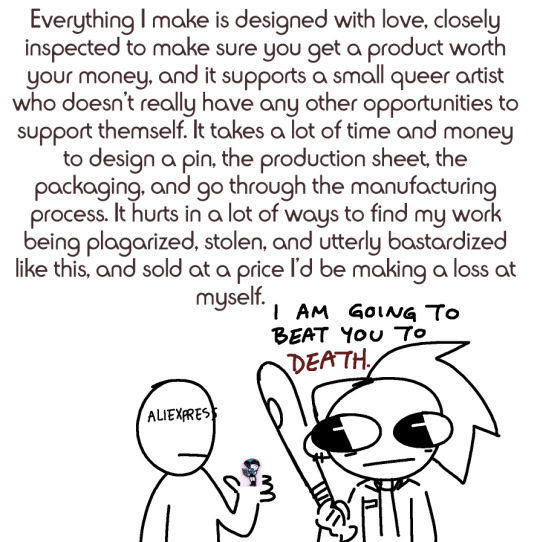
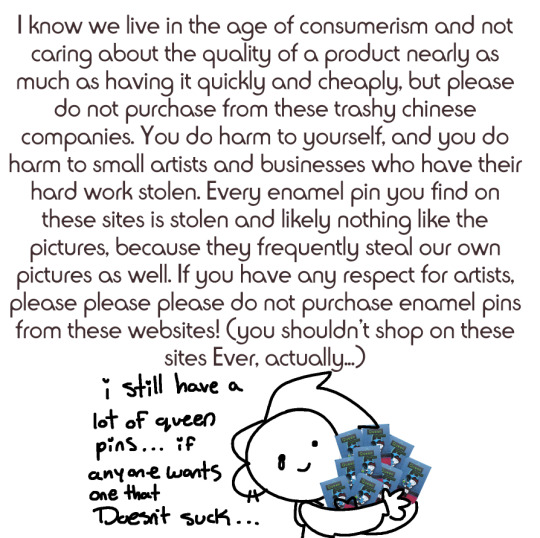
worst way to start my new year, thanks. i have a lot of things to say about these companies but i'm tired and just keeping it focused to the pin side of things for this one. do not ever buy pins from these companies, literally ALL of them are stolen from small artists like me. if you want to buy enamel pins, check out etsy, and artist's personal websites and shops! (though even Etsy has some bootleg pins that ship straight from china, so tread carefully…)
Every pin I've designed is, thus far, EXCLUSIVE to my etsy. if you find it anywhere else, it's been ripped off! and once these stupid bootlegs pop up, it's basically a never ending game of whack-a-mole trying to get them all taken down...
#psa#art theft#pin theft#aliexpress#shein#wish#temu#deltarune#the bootleg pin is just over an inch tall. do you know how BAD this design looks at that size?? i'd know. i tested it.#they didn't even use the black nickel of the pin for the black parts of the design. and the listing says copper for some reason. what.#some people never even get their designs taken down. its really sad#so i might just have to deal with bootleg queens out there forever :( i hope nobody confuses the ripoffs for the real thing....#my pin is so much nicer! its almost two inches big and it has two posts on the back so it doesn't spin#because spinning pins are the bane of my existence#im out here working my ass off out of my bedroom in my parents place trying to make a living and here come these pricks#i watermarked all my listing photos exactly so they Couldn't steal my fucking pictures so at least there's that#my new years is just full of bad luck so far i hope this isn't a bad omen#if my registration isn't accepted by the aliexpress copyright department I'm SOL and this will just. stay up i guess#i'm sad#bootleggers kys
3K notes
·
View notes
Text
Speaking of the US public domain, January 1st, 2024 is a big day for another reason.
To provide some brief historical context, for most of its history the US had no federal copyright regime for standalone audio recordings (i.e., as opposed to the audio component of movies and other multimedia productions), instead allowing the individual states to set their own standards. Many states elected to grant perpetual copyright on audio recordings, a state of affairs which was exploited by record companies to ensure that there was functionally no public domain for audio recordings in the US.
This changed in 1972, with the passage of laws that brought audio recordings in line with federal copyright standards. The changes did not apply retroactively, leaving audio recordings created prior to 1972 under the old state-level perpetual copyrights – and since the federal copyright duration in the US is so long, no post-1972 audio recording has been around long enough for its term to expire.
However, further changes to federal copyright law in 2018 allowed very old audio recordings to be placed in the public domain regardless of where they were produced. Initially, this applied only to audio recordings created in 1922 and earlier, which is why we've suddenly seen a bunch of indie productions making use of old dance-hall recordings in the past couple of years. Provisions to gradually phase out the copyright protection of recordings produced between 1922 and 1972 were also included – and those start kicking in next year, beginning with audio recordings created in 1923.
TL;DR: January 1st, 2024 will be the first time in history that any standalone audio recording has ever entered the US public domain through expiration of the term of its copyright.
If you live in the US and you're a fan of old music, it might be worth looking up what exactly came out in 1923!
4K notes
·
View notes
Text
Side Order Typeface: Complete!
HEY. do you remember when Nintendo made a typeface for Splatoon 3's Side Order and never elaborated? It looks a little bit like this:

Well I went over to the lovely @splatoongamefiles and asked for the font file. They gave me the file, all nice and simple, BUT it was completely unfinished... I really liked it, so I finished it myself!!!
This is what it looked like when I started:

and this is what it looks like now!!!!!!!

It took me 6 months because I apparently started working on this in february, but it only took that long because of my laziness! I did, however, know nothing about this kind of thing before except for my vague interest in typography and fonts. I used a free font-making software called FontForge and I had to learn it from scratch and with no help. So I think all in all, it turned out pretty good!!
I also decided to name the typeface since when I downloaded it, it was called something silly and just for the files so I named it Spire after the Spire of Order which I think works very nicely!!
Now I'll talk about what's changed because I did upload beta version 0.2 of this recently!
added uppercases A, D, G, H, I, K, M, V, W, X
added symbols " # $ % & ' ( ) * + - / < = > [ ] ^ _ ` { | } ¡ £ ¿ × ÷
added all the accents you can see above, but not ALL of them because im lazy
fixed lowercase k so now it looks like a normal letter
B - adjusted sizes of the upper and lower sections as well as sharpened corners of the lower section
K - slightly lowered the crossbar
L - curves of the corners are now slightly smoother
z - raised the top right corner by 1 pixel so its no longer 1 pixel wonky...
@ - increased the gap on the left side
deleted all the original file's kerning and did it myself >:)
and lastly! here's the link to download the typeface!!!!!! if you do use it somewhere credit is always appreciated :))))
p.s. if there are any specific characters/glyphs that I haven't added but u really need please dont hesitate to let me know!!!!
#splatoon 3#side order#side order typeface#splatoon#splatoon side order#splatoon typeface#splatfont#typeface#typography#typefaces#type#font#fonts#i didnt remove the copyright on the file because i couldn't figure it out so fingers crossed nintendo doesnt come for my ass!!!!#or maybe they'll discover it and pay me 1 miiiillion dollars >:)#ANYWAY im suuuuper happy with how it turned out and i hope you all enjoy it :)#reblogs really appreciated bc i really want lots of people to find it and use it!!!
727 notes
·
View notes
Text
Remember when I told you Disney wasn't going to "save you" from AI?
Megacorps like Disney have mountains of exclusive data they "own" that they can use to create their own internal, proprietary, AI systems. They have every sketch, development photo, unused concept art piece, cut scene, note, doodle, rotoscope/animation reference footage, every storyboard, merch design document, you name it.
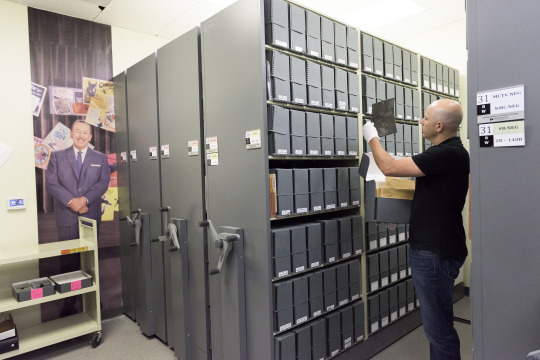
And that's on top of every single frame of every movie and TV show. Every panel of every comic.
That's why Disney supports the efforts to clamp down on AI for copyright reasons, because they own all the copyrights. They want that power in their hands. They do not want you to be able to use a cheap or free utility to compete with them. Along the way, they'll burn the entire concept of fair use to the ground and snatch the right to copyright styles. Adobe has confessed this intention, straight to congress.
When the lawyers come, you won't be accused of stealing from say, artist Stephen Silver. You'll be accused of stealing the style of Disney's Kim Possible(TM).
But don't listen to me. Listen to the Electronic Frontier Foundation.
2K notes
·
View notes
Text
instagram
Not the first time he is committing copyright violations.
Why doesn't the very old man and "Very Stable Genius" just compose his own fucking music? I mean, like "the best music there has ever been, the best music ypu've ever heard ??? Many people say I am a better composer than anyone they've heard of" ....
shouldn" be a problem for a man with his knowledge/skill level ..
Real artists do not support Donald Trump.
#republicans#gop#usa#america#trump#donald trump#democrats#politics#us politics#activism#maga morons#maga clowns#maga#copyrights#music#isaac hayes#law suit#Instagram
303 notes
·
View notes
Text
youtube
tell me lies, tell me sweet little lies
#reigen arataka#kageyama shigeo#mob psycho 100#mp100#animation#cartoon#old#vhs#retro#digital art#my art#unfortunately i had to use a lot of filters because of the fucking copyright#i almost lost my patience ngl#Youtube
161 notes
·
View notes
Text

"Publishers accused the nonprofit of infringing copyrights in 127 books from authors like Malcolm Gladwell, C.S. Lewis, Toni Morrison, J.D. Salinger and Elie Wiesel, by making the books freely available through its Free Digital Library.
The archive, which hosts more than 3.2 million copies of copyrighted books on its website, contended that the library was transformative because it made lending more convenient and served the public interest by promoting "access to knowledge.""
source 1
source 2
source 3
#destiel meme news#destiel meme#news#united states#us news#world news#internet archive#copyright#copyright law#copyright infringement#bookblr#protect access to knowledge#wayback machine#learning is a right#hachette v internet archive#hachette book group#penguin random house#harpercollins#wiley#open library#national emergency library#fair use#controlled digital lending
1K notes
·
View notes
Text
"A federal judge has ruled that artwork created solely by artificial intelligence cannot be copyrighted because “human authorship is an essential part of a valid copyright claim.”
The decision, issued by Judge Beryl Howell, stemmed from computer scientist Stephen Thaler’s efforts to copyright an image he said was created by an AI model, identified as Creativity Machine. Thaler claimed that as the owner of Creativity Machine, he was entitled to the copyright. The Copyright Office rejected that application on the grounds that human authorship is necessary to secure a copyright, prompting Thaler to sue.
Howell ultimately upheld the Copyright Office’s decision, citing long-standing precedent about human authorship. “The act of human creation — and how to best encourage human individuals to engage in that creation, and thereby promote science and the useful arts — was thus central to American copyright from its very inception,” Howell wrote. “Non-human actors need no incentivization with the promise of exclusive rights under United States law, and copyright was therefore not designed to reach them.” ...
Howell’s opinion did nod to the drastically shifting landscape of copyright law in the AI era. She even acknowledged Thaller’s own argument about the malleability of copyright law to account for changes in technology. But again, Howell noted that human authorship remained key."
-via Rolling Stone, August 18, 2023
686 notes
·
View notes
Note
saw you’re drawing THG art again… i love your hunger games art sm, would love to see some solo peeta studies if youre up to it!!!
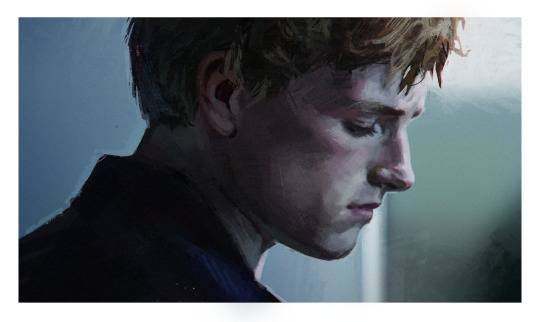
thank you so much!! this is actually my first time ever doing THG art so i'm still working out how to draw the characters haha, glad you're liking it so far!
here's a little peeta study as requested, probably the first of many more :)
speedpaint under the cut since some ppl have asked to see my process!
#my art#fanart#thg#the hunger games#hunger games#the hunger games fanart#hunger games fanart#peeta mellark#digital study#sketch#digital sketch#digital painting#josh hutcherson#wanted to use the primrose song from the mockingjay part 2 soundtrack but got scared of copyright strikes.. had to settle for this instead#</3#process#speedpaint#why does he look more like finnick in this ..
325 notes
·
View notes
Text

Hey, you know how I said there was nothing ethical about Adobe's approach to AI? Well whaddya know?
Adobe wants your team lead to contact their customer service to not have your private documents scraped!
This isn't the first of Adobe's always-online subscription-based products (which should not have been allowed in the first place) to have sneaky little scraping permissions auto-set to on and hidden away, but this is the first one (I'm aware of) where you have to contact customer service to turn it off for a whole team.
Now, I'm on record for saying I see scraping as fair use, and it is. But there's an aspect of that that is very essential to it being fair use: The material must be A) public facing and B) fixed published work.
All public facing published work is subject to transformative work and academic study, the use of mechanical apparatus to improve/accelerate that process does not change that principle. Its the difference between looking through someone's public instagram posts and reading through their drafts folder and DMs.
But that's not the kind of work that Adobe's interested in. See, they already have access to that work just like everyone else. But the in-progress work that Creative Cloud gives them access to, and the private work that's never published that's stored there isn't in LIAON. They want that advantage.
And that's valuable data. For an example: having a ton of snapshots of images in the process of being completed would be very handy for making an AI that takes incomplete work/sketches and 'finishes' it. That's on top of just being general dataset grist.
But that work is, definitionally, not published. There's no avenue to a fair use argument for scraping it, so they have to ask. And because they know it will be an unpopular ask, they make it a quiet op-out.
This was sinister enough when it was Photoshop, but PDF is mainly used for official documents and forms. That's tax documents, medical records, college applications, insurance documents, business records, legal documents. And because this is a server-side scrape, even if you opt-out, you have no guarantee that anyone you're sending those documents to has done so.
So, in case you weren't keeping score, corps like Adobe, Disney, Universal, Nintendo, etc all have the resources to make generative AI systems entirely with work they 'own' or can otherwise claim rights to, and no copyright argument can stop them because they own the copyrights.
They just don't want you to have access to it as a small creator to compete with them, and if they can expand copyright to cover styles and destroy fanworks they will. Here's a pic Adobe trying to do just that:

If you want to know more about fair use and why it applies in this circumstance, I recommend the Electronic Frontier Foundation over the Copyright Alliance.
178 notes
·
View notes